同位语从句及同位语
同位语和同位语从句
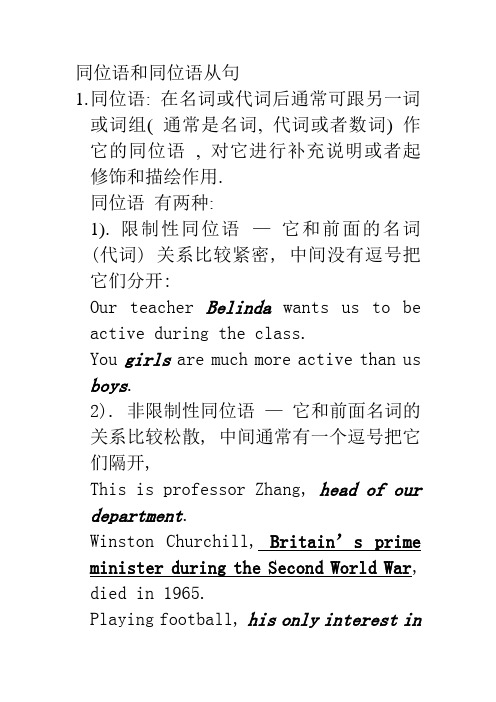
同位语和同位语从句1.同位语: 在名词或代词后通常可跟另一词或词组( 通常是名词, 代词或者数词) 作它的同位语, 对它进行补充说明或者起修饰和描绘作用.同位语有两种:1). 限制性同位语—它和前面的名词(代词) 关系比较紧密, 中间没有逗号把它们分开:Our teacher Belinda wants us to be active during the class.You girls are much more active than us boys.2). 非限制性同位语—它和前面名词的关系比较松散, 中间通常有一个逗号把它们隔开,This is professor Zhang, head of our department.Winston Churchill,Britain’s prime minister during the Second World War, died in 1965.Playing football,his only interest inlife, has brought him many friends.2.同位语从句1).有很多名词后可跟that引导的从句, 说明其内容, 可称为同位语从句(Appositive Clause).There is no doubt that he is a top student.He had the feeling that he would not see her again.We received a message that he would be absent.I had no idea that your husband was opposed to my visit.这些名词常见的还有impression, evidence, belief, conclusion, rumor, report等,2). 在少数情况下可以用连接代词或连接副词引导的从句作同位语。
同位语从句及同位语
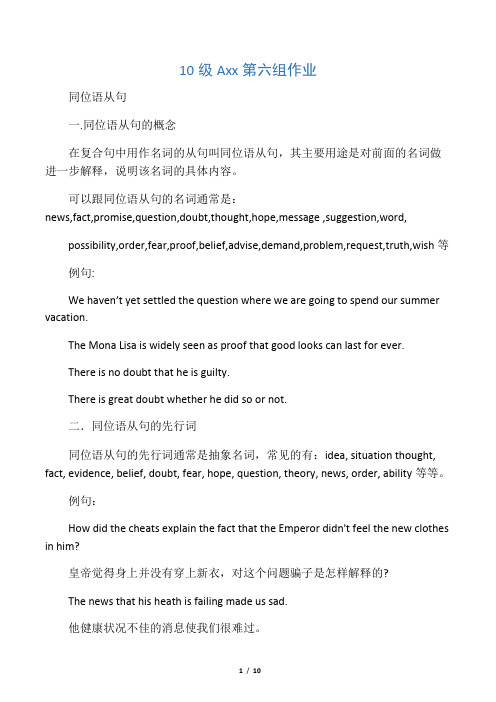
10级Axx第六组作业同位语从句一.同位语从句的概念在复合句中用作名词的从句叫同位语从句,其主要用途是对前面的名词做进一步解释,说明该名词的具体内容。
可以跟同位语从句的名词通常是:news,fact,promise,question,doubt,thought,hope,message ,suggestion,word, possibility,order,fear,proof,belief,advise,demand,problem,request,truth,wish等例句:We haven’t yet settled the question where we are going to spend our summer vacation.The Mona Lisa is widely seen as proof that good looks can last for ever.There is no doubt that he is guilty.There is great doubt whether he did so or not.二.同位语从句的先行词同位语从句的先行词通常是抽象名词,常见的有:idea, situation thought, fact, evidence, belief, doubt, fear, hope, question, theory, news, order, ability等等。
例句:How did the cheats explain the fact that the Emperor didn't feel the new clothes in him?皇帝觉得身上并没有穿上新衣,对这个问题骗子是怎样解释的?The news that his heath is failing made us sad.他健康状况不佳的消息使我们很难过。
I have no idea where they are spending their holidays.我不知道他们在哪里度假。
20-21版:Grammar——同位语及同位语从句(创新设计)
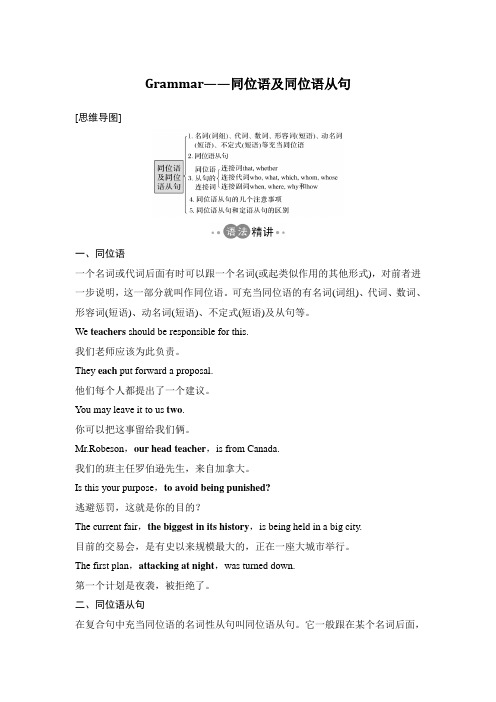
Grammar——同位语及同位语从句[思维导图]一、同位语一个名词或代词后面有时可以跟一个名词(或起类似作用的其他形式),对前者进一步说明,这一部分就叫作同位语。
可充当同位语的有名词(词组)、代词、数词、形容词(短语)、动名词(短语)、不定式(短语)及从句等。
We teachers should be responsible for this.我们老师应该为此负责。
They each put forward a proposal.他们每个人都提出了一个建议。
You may leave it to us two.你可以把这事留给我们俩。
Mr.Robeson,our head teacher,is from Canada.我们的班主任罗伯逊先生,来自加拿大。
Is this your purpose,to avoid being punished?逃避惩罚,这就是你的目的?The current fair,the biggest in its history,is being held in a big city.目前的交易会,是有史以来规模最大的,正在一座大城市举行。
The first plan,attacking at night,was turned down.第一个计划是夜袭,被拒绝了。
二、同位语从句在复合句中充当同位语的名词性从句叫同位语从句。
它一般跟在某个名词后面,用来说明前面名词的具体内容。
常见的这类名词有:fact,news,hope,truth,idea,suggestion,thought,question,promise,order,problem,belief,word,message,information,proof,announcement,desire,doubt,proposal,advice,possibility等。
His accent at once betrayed the fact that he was a foreigner.他的口音立刻显示出他是一个外国人。
同位语从句讲解及练习含答案
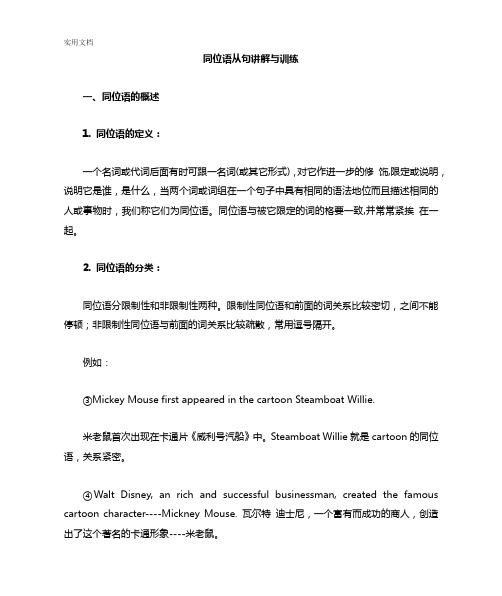
同位语从句讲解与训练一、同位语的概述1. 同位语的定义:一个名词或代词后面有时可跟一名词(或其它形式),对它作进一步的修饰,限定或说明,说明它是谁,是什么,当两个词或词组在一个句子中具有相同的语法地位而且描述相同的人或事物时,我们称它们为同位语。
同位语与被它限定的词的格要一致,并常常紧挨在一起。
2. 同位语的分类:同位语分限制性和非限制性两种。
限制性同位语和前面的词关系比较密切,之间不能停顿;非限制性同位语与前面的词关系比较疏散,常用逗号隔开。
例如:③Mickey Mouse first appeared in the cartoon Steamboat Willie.米老鼠首次出现在卡通片《威利号汽船》中。
Steamboat Willie就是cartoon的同位语,关系紧密。
④Walt Disney, an rich and successful businessman, created the famous cartoon character----Mickney Mouse. 瓦尔特迪士尼,一个富有而成功的商人,创造出了这个著名的卡通形象----米老鼠。
an rich and successful man 是主语Walt Disney的同位语,句子中有没有它,无所谓,不影响理解。
而且“瓦尔特迪士尼”是个“富有而成功的商人”,反过来,“一个富有而成功的商人”可不一定就是“瓦尔特迪士尼”。
3. 同位语的形式:(1)名词用作同位语时最多:①This is Mr.Brown,our Spanish teacher.这是我们的西班牙语老师布朗先生。
②“Leave it to me,”said Lao He,the man on night duty.值夜班的人老何说:“这事交给我。
”③You girls may take those seats over there.你们姑娘们可以坐在那边的座位上。
同位语构成及同位语从句翻译+讲义-2025届高三英语上学期一轮复习专项

同位语(Appositive)同位语本质上是一种修饰语,它对与之同位的名词词组提供补充说明、修饰和描绘的作用。
一、常见组成:1.名词词组,位置一般在与之同位的名词之后,也有提前或置于句末的情况。
Your brother, a proud and unbending man, refused all help that was offered him.Streamlined swimmers and bloodhounds of the sea, sharks are equipped with an extraordinary sense of smell.Only one problem still remains—the storage of the grain.An excellent, all-round student with a congenial personality, Miss Ruel is a promising candidate for wow, an international scholarship program for outstanding women around the word.2.代词(反身代词/不定代词/指示代词)My father will go and see it himself. (reflexive pronoun)My friends all understand me. (indefinite pronoun)Air, food, water and heat—these are four requirements of all living things.(demonstrative pronoun)3.非谓语小句She liked her job, teaching English. (gerund)During all those years the young man had but one aim—to fight for the independence of his motherland.(infinitive)4.同位语从句(略)answer, advice, assurancebelief,conclusion, commanddecision, discovery, doubt, demand, desire,explanation, evidence,fact, feelinghope,guaranteeidea, information, insistence, instruction, impressionknowledge,law,message,news,opinion, order,possibility, problem, promise, proof, proposal, plan, propositionquestion,report, risk, rumor, recommendation, request, requirement,story, suggestiontruth, theory, thought,wish, word二、常用引导方式:1.标点符号(comma, dash)2.介词(of)The city of Shanghai=the city, ShanghaiThe month of May=the month, MayThe art of painting=the art, painting3.引导词(表等同关系/列举关系/突出重点)(1)namely, that is(i.e.), that is to say, in other words, or, for short…A pronoun is a pro-form, i.e. a form used to refer to a person or a thing.He studies linguistics, or the science of language.He is a cutler -that is to say, a man who sells knives and sharp tools.(2)f or example, for instance, such as, say, including…Some animals, for example the fox and squirrel, have bushy tails.Besides English he knows other foreign languages, such as French and German.Any dictionary, say Hornby's Advanced Learner's Dictionary, will serve my purpose for the time being.(3)e specially, particularly, chiefly, mostly…Most students in our class, particularly David and Chris, are fond of music. I want very much to read these new novels, especially the one you mentioned.4.同位语从句引导词(关系代词/关系副词)关系代词:Who、whose、which、that关系副词:when、where、why、how三、同位语的翻译1.翻译成名词前的定语We have been fortunate to have Mr. Jackson, a distinguished linguist from the United States, with us today."今天能邀请到美国著名的语言学家杰克逊先生,我们感到非常荣幸。
同位语和同位语从句
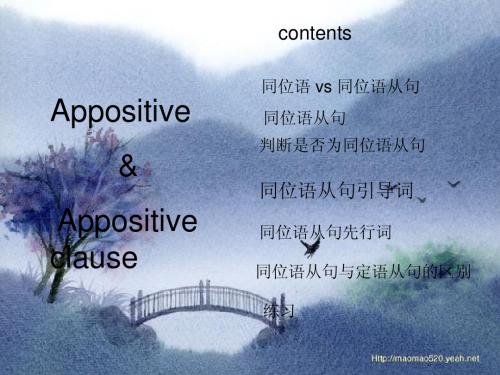
Who is that man, the first in the front row?
3.句子作同位语 The news that the oil price will go down is untrue. (同位语从句)
需注意的情况:
有时候主句的谓语比较短,同位语从句比较长,这个从 句就不一定紧接在它所说明的名词后面。 如:Word came that our Chinese women team had beaten Japanese. The story goes that the lost child has gone abroad.
2.The suggestion(that) they are considering is that students should learn something practical.
exercise
My friend showed me round the town,_____was very kind of him. A.which B.ght came to him that the criminal might have disguised.
A story goes ____ Elizabeth I of England D liked nothing more than being surrounded by clever and qualified noblemen at court. A. when B. where C. what D. that
需注意的情况:
在某些名词: demand ,wish ,suggestion ,resolution 等后面的同位语从句要用虚拟语气 There was a suggestion that Brown should be dropped from the team. 有一项建议是布 朗应该离队。 同位语与被它限定的词的格要一致,并 常常紧挨在一起。
雅思写作句子成分之同位语及同位语从句
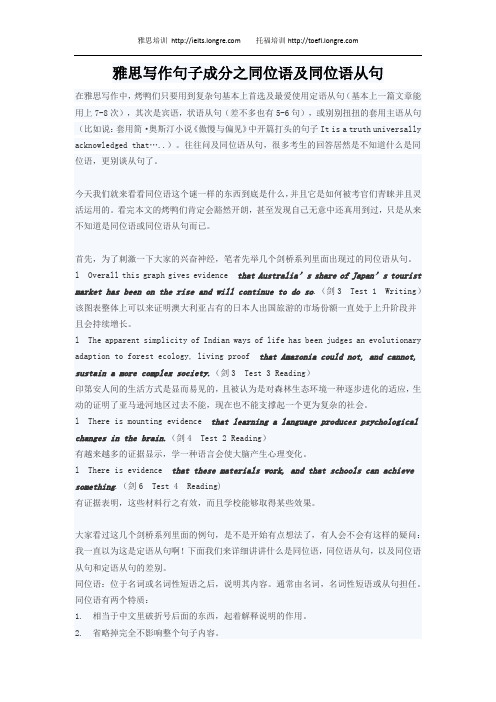
雅思写作句子成分之同位语及同位语从句在雅思写作中,烤鸭们只要用到复杂句基本上首选及最爱使用定语从句(基本上一篇文章能用上7-8次),其次是宾语,状语从句(差不多也有5-6句),或别别扭扭的套用主语从句(比如说:套用简·奥斯汀小说《傲慢与偏见》中开篇打头的句子It is a truth universally acknowledged that…..)。
往往问及同位语从句,很多考生的回答居然是不知道什么是同位语,更别谈从句了。
今天我们就来看看同位语这个谜一样的东西到底是什么,并且它是如何被考官们青睐并且灵活运用的。
看完本文的烤鸭们肯定会豁然开朗,甚至发现自己无意中还真用到过,只是从来不知道是同位语或同位语从句而已。
首先,为了刺激一下大家的兴奋神经,笔者先举几个剑桥系列里面出现过的同位语从句。
l Overall this graph gives evidence that Australia’s share of Japan’s tourist market has been on the rise and will continue to do so.(剑3 Test 1 Writing)该图表整体上可以来证明澳大利亚占有的日本人出国旅游的市场份额一直处于上升阶段并且会持续增长。
l The apparent simplicity of Indian ways of life has been judges an evolutionary adaption to forest ecology, living proof that Amazonia could not, and cannot, sustain a more complex society.(剑3 Test 3 Reading)印第安人间的生活方式是显而易见的,且被认为是对森林生态环境一种逐步进化的适应,生动的证明了亚马逊河地区过去不能,现在也不能支撑起一个更为复杂的社会。
同位语 同位语从句

同位语当两个词或词组在一个句子中具有相同的语法地位而且描述相同的人或事物时,我们称它们为同位语。
同理,当两个指同一人或事物的句子成分放在同等位置时,若其中一个句子成分是用于说明或解释另一个句子成分的,那么用于起说明或解释作用的句子成分就叫做另一成分的同位语。
同位语是句子成分的一种, 它位于名词、代词后面, 说明它们的性质和情况, 它可以由名词、代词、名词性短语或从句充当。
一.同位语的表现形式同位语的表现形式有以下几种:(1) 名词Tom, our monitor, is a handsome boy.(2) 代词I myself will do the experiment.(3) 数词She is the oldest among them six. (4) 从句He told me the news that the plane had exploded.他告诉我飞机爆炸的消息。
(5) 由such as, that is引导Some subjects, such as maths andphysics, are very difficult to learn.某些学科,例如数学和物理,是很难学的。
(6) 由of 引导The city of Beijing has been greatly changed since 2000.自从2000年以来, 北京市发生了很大的变化。
(7) 由or 引导The freezing temperature, or freezing point, is the temperature at which water freezes under ordinary pressure.结冰温度即冰点,是水在常压下结冰时的温度。
二.同位语的用法用法1:由两个或两个以上同一层次的语言单位组成的结构,其中前项与后项所指相同,句法功能也相同,后项是前项的同位语。
Mr. Smith, our new teacher, is very kind to us.我们的新老师史密斯先生对我们很好。
- 1、下载文档前请自行甄别文档内容的完整性,平台不提供额外的编辑、内容补充、找答案等附加服务。
- 2、"仅部分预览"的文档,不可在线预览部分如存在完整性等问题,可反馈申请退款(可完整预览的文档不适用该条件!)。
- 3、如文档侵犯您的权益,请联系客服反馈,我们会尽快为您处理(人工客服工作时间:9:00-18:30)。
whether“是否”可以引导:
主语从句,宾语从句,表语从句。
if“是否”,只能引导宾语从句和表语从句,不能引导主语从句。
3.其它引导词引导的同位语从句
连接代词what, who, whom, whose, which引导同位语从句
1).I have no idea what size shoes she wears.我不知道她穿几号的鞋。(what作定语)
他健康状况不佳的消息使我们很难过。I have no idea where they are spending their holidays.
我不知道他们在哪里度假。
The question who should do the work requires consideration.
谁该干这项工作的问题需要考虑
(that引导同位语从句对fact的具体内容进行说明,that在其中不充当具体的句子成分)
② I won’t believe the fact (that) he told me.我不愿相信他告诉我的事实。
(that引导定语从句对fact进行限定,that在该从句中充当宾语)(3)第三组例句:
① The news that Tom would go abroad is told by him.汤姆将出国的消息是他讲的。
(that引导同位语从句对news来自具体内容进行说明,that在其中不充当具体的句子成分)
② The news that he told me is that Tom would go abroad next year.他告诉我的消息是汤姆来年将出国。
(句中的第一个that引导定语从句限定先行词news,第二个that引导表语从句)
(引导词that就是that引导的从句中have的宾语,the problem的具体内容也没有得到说明,故本句中that引导的从句是修饰problem的定语从句)(2)第二组例句:
① I won’t believe the fact that helied to his mother.我不愿相信他对母亲撒谎的事实。
2.连接词的作用不同。连接同位语从句的that只起连接作用,不在从句中担任任何句子成分。whether和how可以引导同位语从句,但不能引导定语从句。关系代词和关系副词除了连接从句的作用外,还在定语从句中充当一定的句子成分,如主语、宾语、定语、表语等。引导定语从句的连接词是关系词,常见的关系代词和关系副词有that,which,who,whose , whom , when , where ,why , as,than, but等。
I have got some newsthatyou may not have heard.(定语从句)The newsthatRussia had solved the hostage cris spread all over the world.(同位语从句)
例句:
How did the cheats explain the fact that the Emperor didn't feel the newclothesin him?
皇帝觉得身上并没有穿上新衣,对这个问题骗子是怎样解释的?The news that his heath is failing made us sad.
(4)第四组例句:
① We have no idea at all where he has gone.我们根本不知道他去哪里了。(where引导同位语从句说明idea的具体内容)
② That’s the place where he was born.那是他出生的地方。
(where引导定语从句限定先行词place)
他拿起了手提箱,给人的印象是他要登上飞往东京的飞机了。
2.连词whether引导同位语从句
The question whetherweshouldcallin a specialist wasansweredbythefamilydoctor.我们是否请专家由家庭医生来定。
We are not investigating the question whether he is trustworthy.我们不是在调查他是否可以信任的问题。
(1)第一组例句:
① We can’t solve the problem how we can travel faster than light.我们解决不了如何才能超过光的速度这个问题。
(how引导的从句表示其前面的名词the problem的具体内容,属于同位语从句)② I can’t rember the problem that they have.我记不得他们的问题了。
以下名词常用于以上句型:
advice, announcement, argument, belief, claim, conclusion, decision,evidence,explanation, fact, feeling, hope, idea, impression, information,knowledge, message,news, opinion, order, probability, promise, proposal,remark, reply, report, saying,statement, suggestion, thought, treat,warning, wish, word
五.同位语从句和定语从句的区别
1.从句所修饰词的不同。同位语从句所修饰词通常是少数一些表示抽象意义的名词,如
belief,doubt,fact,hope,idea,news,possibility,thought,order,suggestion,wish,answer,information,conclusion,decision,discovery,knowledge,law,opinion , problem , promise ,proof , question , report , truth , risk等。定语从句的先行词可以指人、物等
2."同位语从句和定语从句结构相似,通常位于某一名词或代词后面,但两者存在明显区别:
同位语从句对名词性成分加以补充说明,是该名词性成分具体内容的体现(相当于名词的作用)。that引导的同位语从句中引导词that不在该同位语从句中充当句子成分,但不能被省略,同位语从句还可以用whether、how等连词引导(定语从句则不能)。定语从句对先行词加以限制或修饰、说明先行词的性质或特征(相当于形容词的作用),定语从句的引导词均在该定语从句中充当特定的句子成分(that在其引导的限定性定语从句中充当主语、宾语或者表语,充当定语从句中宾语的that经常可被省略)。注意体会以下四组例句:
4.连接副词引导同位语从句
连接副词when, where, how, why
We haven’t yet settled the question where we are going to spend oursummervacation.到哪儿去度暑假,这个问题我们还没有决定。
四.同位语从句的用法
10级Axx第六组作业
同位语从句
一.同位语从句的概念
在复合句中用作名词的从句叫同位语从句,其主要用途是对前面的名词做进一步解释,说明该名词的具体内容。
可以跟同位语从句的名词通常是:
news,fact,promise,question,doubt,thought,hope,message ,suggestion,word,possibility,order,fear,proof,belief,advise,demand,problem,request,truth,wish等例句:Wehaven’tyetsettledthequestionwherewearegoingtospendoursummervacation.TheMona Lisa is widely seen as proofthatgood looks can last for ever.There is nodoubtthathe is guilty.
3.从句作用的不同。定语从句具有形容词或副词的特点,对先行词起修饰、限定作用,描述先行词的性质或特征,与先行词之间是所属关系。同位语从句具有名词的特点,对中心词作进一步补充解释,是中心词的具体内容。
注:
同位语从句是对名词加以说明,而定语从句是对名词加以限定修饰。
区分同位语从句和定语从句有一种简便方法,就是将“名词+that”结构取出,能在名词和that之间加上be动词构成一个表语从句的,则是同位语从句,否则是定语从句。
【注意1】在某些名词(如demand, wish, suggestion, resolution等)后面的同位语从句要用虚拟语气。如:
There was a suggestion that Brown should be dropped from the team.有一项建议是xx应该离队。
The suggestion that the new rule be adopted came from the chairman.采纳新规则的建议是主席提出的。The resolution that women be allowed to join the society was carried.允许妇女参加这个协会的决议通过了。
I can understand their eagerness that you should be the main speaker.我理解他们希望你作主要发言人的殷切心情。
【注意2】引导同位语从句的连词that通常不省略,在非正式语体中that可以省略。
He gabbed his suitcase and gave the impression he was boarding the Tokyoplane.
